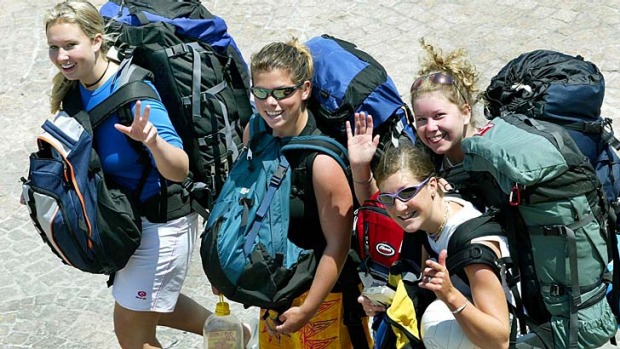
The first thing you need to ask yourself is: what kind of traveller am I? This will go a long way to deciding which backpack is best for you.
Are you a hardcore hiker who's going to benefit from one of those tall top-loaders? Are you an intrepid explorer who's going to be chucking their pack onto boats, clambering into jeeps, sitting on top of buses? Something hardy and easy to carry is going to be good for you. Or are you a more sedate traveller who's going to spend more time on city streets than on dusty mountain trails? Then a hybrid might be perfect.
It's a little intimidating the first time you step into a travel store and are presented with all of the backpack options, walls filled with bags of different sizes, colours, prices and designs. There are, however, things that every traveller should be looking for.
The first thing to consider, obviously, is use. Different backpacks are designed for different types of travellers, and if you can spell out exactly what you'll be using yours for to the salesman in the store, that could go a long way to narrowing down your seemingly endless options.
A piece of advice: shop around. Go to every different travel store you can (fortunately they all seem to be next to each other). Try on as many backpacks as you can. Put them on your shoulders. Have the attendant adjust the straps to fit your body shape. Pack some weight into the bags. Walk around the store. Open the bags up and check the pockets, the straps, the durability.
Most travellers, in my experience, don't need anything too hardcore. Unless you're planning to overland in Africa or schlep your way through India for six months, you probably don't need anything with gigantic padded straps or an army-issue harness. For the last few years I've been travelling with an Osprey hybrid bag – kind of a backpack with a handle and wheels – and have only had to pull out the shoulder straps five or six times.
Don't be afraid of wheels. They add extra weight and take up extra space, but if you're only travelling through the Western world, or staying in nice places, weight won't matter a great deal as you're wheeling your bag breezily past all of the proper backpackers.
For those proper backpackers, however, make sure you thoroughly test the straps and harness system of your potential bag in the shop. There are a million different designs out there, but the only right one is the one that feels most comfortable for you. Generally, however, the more adjustments you can make, the better.
Next up, check out the backpack's zips and opening system. If the pack only has one opening, you want the zips to go as far down the bag as possible to avoid half of your clothes getting lodged in some dark corner at the bottom of your pack and never being used.
I prefer packs with two compartments: a large one on top, and a smaller one at the bottom that allows you to quarantine clothes that haven't seen a washing machine in a few weeks, or wet towels or dirty shoes. It's a good way of keeping things organised too, and allows better access to all of your gear.
Look, too, for internal pockets, which are another great way of organising things like charging cables, batteries, a torch, elastic clothes line… Basically all of the things that would get annoyingly lost if they were just thrown in with your clothes. The more internal pockets, the better.
Exterior straps can be great, too, for carrying things like sleeping bags or tying on dirty shoes. Try to find a pack with at least two exterior straps.
Pretty much all backpacks these days also come with a daypack, and it's worth paying just as much attention to this daypack as the main bag itself, because it's the smaller version that you'll be spending most of your time with on a day-to-day basis.
Make sure it's of a reasonable size – there's nothing more annoying than a tiny daypack that you can barely get a camera into (OK, there are far more annoying things, but you get my drift). Make sure it's sturdy and comfortable on your shoulders. Like I said, this is the pack that you'll spend most of your time carrying – it needs to feel comfy.
Remember, however, that if you really love a backpack but hate the daypack, you can always ditch the little bag and buy something for day use separately. The only advantage of a dedicated daypack is that it will probably clip easily onto the shoulder straps of your backpack when you're carrying both at once.
One of the final things to think about is what size backpack to buy. It's tempting to go with something gigantic so that you can fit all of those amazing snow globes and keyrings in, but my advice would be to go for the smallest bag you think you can manage. An 85-litre monster is ridiculous – for most travellers, 65-70L should be plenty.
After all, you're going to have to carry this stupid thing around on your back, maybe for hours at a time. How heavy do you want it to be? And you can survive with far fewer clothes than you think. Buying a smaller bag forces you to pack light, which has to be a good thing. Just leave enough room for souvenirs and you're all set.
Happy travels.
What are your tips for finding the perfect backpack?
Email: [email protected]
Instagram: instagram.com/bengroundwater